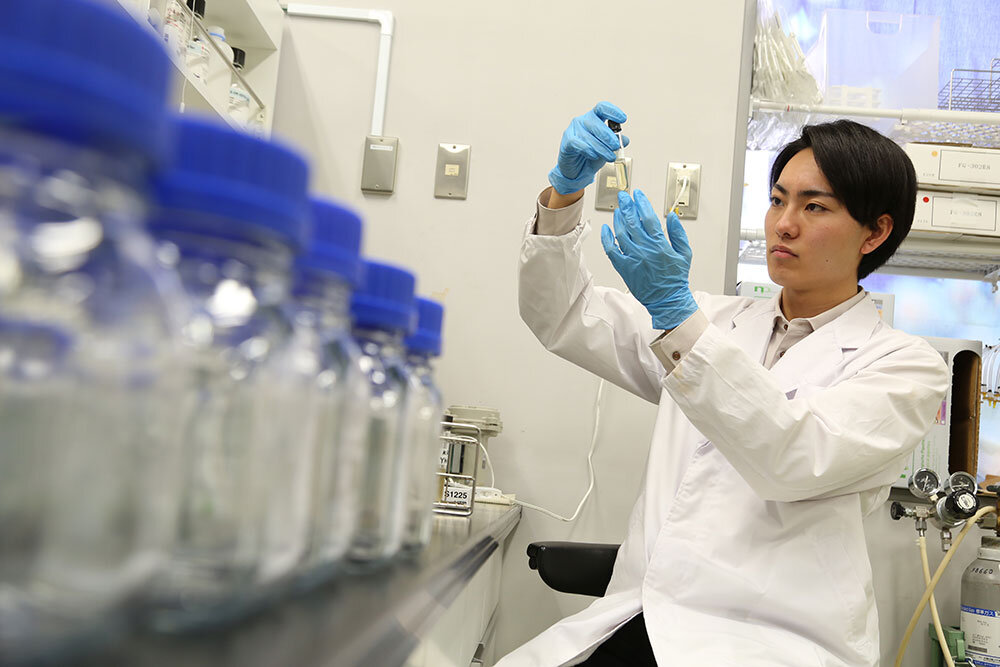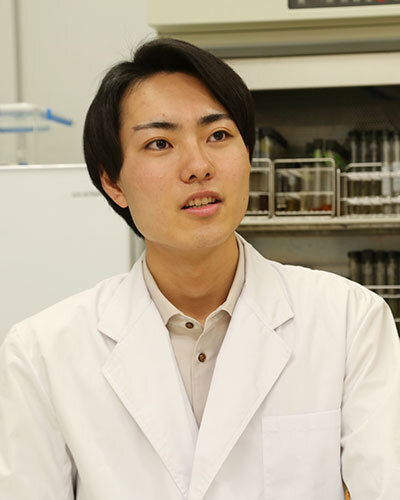INTRODUCTION学生紹介
- HOME
- support
- Student Introduction
- KOREMURA SEITARO
STUDENT INTRODUCTION
Marine Resources and Environment
KOREMURA SEITARO
Specializations:Ocean Sciences
Main academic advisor:MAKITA, Hiroko
Mentor:KOIWAI, Keiichiro / KONDO, Hidehiro

Research is my hobby, and I am happy to devote every minute I can each day to my research
Using the power of microbes to repair cracked concrete deep in the ocean
I graduated from a university in Fukui, where I was engaged in broad-based research into microbes and viruses. It was around the time I was considering whether to enter postgraduate study that I first learned about "self-healing concrete" that repairs its own cracks using the power of microbes. "If only this technology could be applied in the ocean, we could expand the ways we utilize it." With this thought in mind, I looked for a graduate school where I could pursue this research and entered the Graduate School of Marine Science and Technology. I am currently researching the biological effect of microbes on concrete materials when they are installed deep in the ocean.
Japan is surrounded by oceans, almost all of which have depths of 200 meters or more. There is a continuing debate about how Japan will more effectively use these deep oceans in the future, with plans to build man-made structures and marine infrastructure to utilize deep ocean areas. Various types of concrete and cement materials, which are inexpensive and long-lasting, will be used for this development. I am investigating the effects on these materials when they are positioned in deep oceans from a microbiological perspective. Microbes can sometimes have a positive effect on durability, but they can also bring about the deterioration and destruction of some materials. I evaluate these opposing effects to determine how to improve materials in the future and investigate what kind of materials would be best suited to building structures in deep oceans.
In my research under the WISE Program, I am applying AI machine learning technology to predict what kind of effect the microbes living in deep ocean areas will have on concrete. This research goes one step further than the effects of microbes to focus on ways that we can build man-made structures in deep oceans.
The WISE Program encouraged me to take on new challenges
 I have dreamed of being a researcher since childhood and hoped to advance to the doctoral level. I decided to join the WISE Program because it continues right through to the end of the doctoral course, matching my hopes perfectly. The WISE Program also enables participants to study AI, an area that I am not deeply familiar with, and it also catered to my desire to take on new challenges.
I have dreamed of being a researcher since childhood and hoped to advance to the doctoral level. I decided to join the WISE Program because it continues right through to the end of the doctoral course, matching my hopes perfectly. The WISE Program also enables participants to study AI, an area that I am not deeply familiar with, and it also catered to my desire to take on new challenges.
Under the program, I attend two or three lectures on AI each week, as well as lectures on my area of specialization. Including assignments and independent study, I suppose I spend around 10 hours per week studying for the WISE Program. I only began learning about AI in graduate school, and the classes enable me to learn the principles and applications of AI and gain practical knowledge first-hand.
Meeting with others is another attraction of the WISE Program
Participating in the WISE Program has enabled me to enter a world I didn't even know existed. I have been able to meet people with diverse ways of thinking and varied aspirations. I have also come to know people aiming for the same field as mine, and it's really valuable for me to be able to strive to achieve my dreams together with these new companions.
The lectures are taught by speakers from commercial companies and those fully utilizing AI. The ability to ask questions, discuss, and communicate across the age gap is also appealing to me.
Next year I will board a corporate research vessel and actually travel to the deep ocean!
I conduct research in a team of three members from the university laboratory. The most enjoyable aspect of this research is discussing specialized topics with my teammates. These aren't the kind of conversations I can have with just anyone I meet, but as my teammates and I are all studying the same things, our discussions actually get quite lively. The opportunity to present experimental results to others also provides an incentive, and I'm really happy to be able to attend academic conferences and speak with a range of other researchers.
Deep oceans are difficult to access, and they are not places where I can get to by myself. As it turns out, however, there are opportunities to visit the ocean depths, and with the help of a company researching deep oceans, I will be able to board a research vessel and descend to 3,000 meters or more below sea level. This year, the second-year students were given this opportunity, and next year it will be my turn, so I'm really looking forward to it.
I will strive to realize my research dreams
Research is my hobby. I enjoy my research and learning so much that I am constantly reading through the scientific literature, even on holidays. I am using all available time to deepen my research knowledge, and I am very lucky to have an environment that makes this possible.
It is my hope that one day, my research will lead to practical applications for building man-made structures in the deep oceans. While this is still just a dream, we have already discovered that marine microbes can create a barrier around concrete that effectively prevents its deterioration. If we can create practical applications for this, it will help in the construction of seabed pipelines, and also lead to the development of offshore wind power generation in shallower waters.
It may take some time before we uncover these practical applications, but I hope to create a body of new knowledge and revitalize this research field so that we can gradually achieve my dream.

